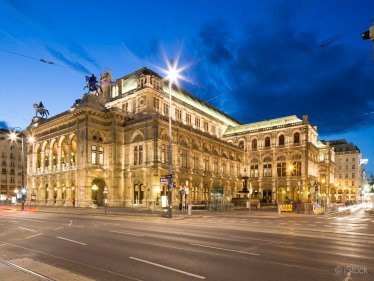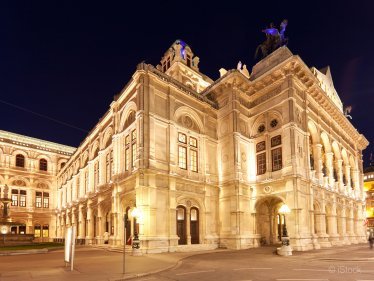Faust - Schedule, Program & Tickets
Faust
Text Jules Barbier & Michel Carre after Johann Wolfgang von Goethe
Opera in five acts
Cast
Musical direction
Bertrand de Billy
Staging
Frank Castorf
Stage
Aleksandar Denić
Costumes
Adriana Braga Peretzki
Light
Lothar Baumgarte
Assistant director
Wolfgang Gruber
Video direction
Martin Andersson
Camera/Image composition
Tobias Dusche Daniel Keller
Dramaturgy
Ann-Christine Mecke
Doctor Faust
Piotr Beczala
Marguerite
Nicole Car
Méphistophélès
Adam Palka
Valentin
Stefan Astakhov
Wagner
Jusung Gabriel Park
Siébel
Patricia Nolz
Marthe
Monika Bohinec
Contents
The tenor aria »Salut, demeure chaste et pure« (»Hail, chaste and pure dwelling«) is exemplary of Charles Gounod's treatment of Johann Wolfgang von Goethe's tragedy: On the one hand, the text is based almost verbatim on the original, on the other hand, the music adds so much languorous feeling that it was too much for many a guardian of the Grail of sensual refinement in German culture: while Faust sings of the »innocent and divine soul« of the absent Marguerite , the solo violin nestles like a duet partner to his melody. And "the melody is delightful," even the Gounod skeptic Hector Berlioz said in his review of the premiere: "They applauded, but not enough, the aria deserved a hundredfold applause."
Of course, other French versions of Faust from the 19th century would have given the German guardians of the Grail even more cause for irritation: in numerous crudely comical scenes, they not only sent Faust and Mephisto to the Harz mountains, but also to Mount Vesuvius or even to India. Gounod's opera, which premiered in Paris in 1859, sticks relatively closely to Goethe's original, but dispenses with many figures and scenes and sets its own priorities: the old Faust is less tormented by the question of "what holds the world together at its core" than by the longing for love and Youth. Méphistophélès, less intellectual "principle of negation" than devilishly attractive magician, draws his attention to Marguerite - and Faust is enthusiastic. A deal is quickly struck: the devil serves Faust on earth, after Faust's death it should be the other way around. Marguerite, too, is not unimpressed by what Méphistophélès has to offer: material luxury and sensual pleasure, often illustrated with a musical waltz by Gounod. But the relationship between Faust and Marguerite remains an episode, because Faust is drawn to new attractions, while Marguerite initially stays behind pregnant, only to then experience how her faithless lover kills her brother.
Gounod's Mephistophelic principle of seduction to sensuality was also effective in the transmission of this opera: around a third of the planned text had already been deleted before the premiere. Numbers that had already been composed and discarded were lost or wound up in attics, only to be rediscovered there more than 100 years later. In the meantime, the international opera business created its own form of work, a process in which sensuous melodies and sonorous choruses triumphed over any intellectual doubt. Gounod presents himself as an experienced church musician in the scene in the Minster, which musically anticipates the optimistic end of the opera: Marguerite, who risked everything for her love and lost it, is saved from eternal damnation.
Frank Castorf, who as probably the most influential director of the last few decades has changed theater worldwide, unfolds a multi-layered story in his production: Paris at the time of the premiere meets Paris around 1960, in which conflicts culminated in the highly capitalist and colonialist era of Gounod had their starting point and at the same time led to the crises of our European present: in Aleksandar Denić's stage design, it is only a few steps from Notre Dame to the »Stalingrad« metro station. Adriana Braga Peretzki's opulent costumes refer to different times, milieus and cultures. While one can rightly accuse the librettists Michel Carré and Jules Barbier of having considerably simplified Goethe's »Welttheater«, the team of directors adds a new complexity to the work through the multitude of references. The philosophical “spirit that always denies” no longer makes an appearance in the opera itself, but it was all the more powerful in its staging process: “I am for irritation, the Mephistophelic principle of negation, without saying for whom, why and why,« Castorf once confessed in a conversation.
Subject to change.
Opera in five acts
Cast
Musical direction
Bertrand de Billy
Staging
Frank Castorf
Stage
Aleksandar Denić
Costumes
Adriana Braga Peretzki
Light
Lothar Baumgarte
Assistant director
Wolfgang Gruber
Video direction
Martin Andersson
Camera/Image composition
Tobias Dusche Daniel Keller
Dramaturgy
Ann-Christine Mecke
Doctor Faust
Piotr Beczala
Marguerite
Nicole Car
Méphistophélès
Adam Palka
Valentin
Stefan Astakhov
Wagner
Jusung Gabriel Park
Siébel
Patricia Nolz
Marthe
Monika Bohinec
Contents
The tenor aria »Salut, demeure chaste et pure« (»Hail, chaste and pure dwelling«) is exemplary of Charles Gounod's treatment of Johann Wolfgang von Goethe's tragedy: On the one hand, the text is based almost verbatim on the original, on the other hand, the music adds so much languorous feeling that it was too much for many a guardian of the Grail of sensual refinement in German culture: while Faust sings of the »innocent and divine soul« of the absent Marguerite , the solo violin nestles like a duet partner to his melody. And "the melody is delightful," even the Gounod skeptic Hector Berlioz said in his review of the premiere: "They applauded, but not enough, the aria deserved a hundredfold applause."
Of course, other French versions of Faust from the 19th century would have given the German guardians of the Grail even more cause for irritation: in numerous crudely comical scenes, they not only sent Faust and Mephisto to the Harz mountains, but also to Mount Vesuvius or even to India. Gounod's opera, which premiered in Paris in 1859, sticks relatively closely to Goethe's original, but dispenses with many figures and scenes and sets its own priorities: the old Faust is less tormented by the question of "what holds the world together at its core" than by the longing for love and Youth. Méphistophélès, less intellectual "principle of negation" than devilishly attractive magician, draws his attention to Marguerite - and Faust is enthusiastic. A deal is quickly struck: the devil serves Faust on earth, after Faust's death it should be the other way around. Marguerite, too, is not unimpressed by what Méphistophélès has to offer: material luxury and sensual pleasure, often illustrated with a musical waltz by Gounod. But the relationship between Faust and Marguerite remains an episode, because Faust is drawn to new attractions, while Marguerite initially stays behind pregnant, only to then experience how her faithless lover kills her brother.
Gounod's Mephistophelic principle of seduction to sensuality was also effective in the transmission of this opera: around a third of the planned text had already been deleted before the premiere. Numbers that had already been composed and discarded were lost or wound up in attics, only to be rediscovered there more than 100 years later. In the meantime, the international opera business created its own form of work, a process in which sensuous melodies and sonorous choruses triumphed over any intellectual doubt. Gounod presents himself as an experienced church musician in the scene in the Minster, which musically anticipates the optimistic end of the opera: Marguerite, who risked everything for her love and lost it, is saved from eternal damnation.
Frank Castorf, who as probably the most influential director of the last few decades has changed theater worldwide, unfolds a multi-layered story in his production: Paris at the time of the premiere meets Paris around 1960, in which conflicts culminated in the highly capitalist and colonialist era of Gounod had their starting point and at the same time led to the crises of our European present: in Aleksandar Denić's stage design, it is only a few steps from Notre Dame to the »Stalingrad« metro station. Adriana Braga Peretzki's opulent costumes refer to different times, milieus and cultures. While one can rightly accuse the librettists Michel Carré and Jules Barbier of having considerably simplified Goethe's »Welttheater«, the team of directors adds a new complexity to the work through the multitude of references. The philosophical “spirit that always denies” no longer makes an appearance in the opera itself, but it was all the more powerful in its staging process: “I am for irritation, the Mephistophelic principle of negation, without saying for whom, why and why,« Castorf once confessed in a conversation.
Subject to change.
There are no products matching the selection.



